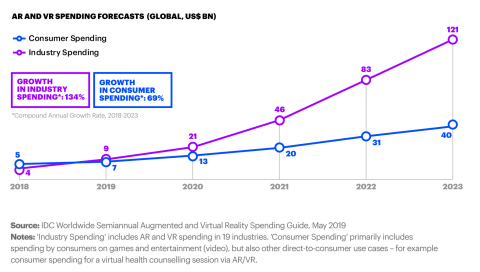Early responsible business approaches can sustain explosive growth of XR opportunities
NEW YORK — (BUSINESS WIRE) — May 15, 2019 — Despite its potential to provide tremendous economic and social benefits, extended reality (XR) carries new physical, mental and social risks that require business leaders to proactively design, build and deploy XR tools and business models responsibly from the start, according to a new report from Accenture (NYSE: ACN).
This press release features multimedia. View the full release here: https://www.businesswire.com/news/home/20190515005041/en/

(Graphic: Business Wire)
Waking Up to a New Reality: Building a Responsible Future for Immersive Technologies,” published in collaboration with the G20 Young Entrepreneurs’ Alliance (G20 YEA), examines how extended reality (XR) — which includes virtual reality (VR), augmented reality (AR) and a growing range of other immersive tools — is already creating new value well beyond the worlds of gaming and entertainment. In addition to delivering enhanced customer experiences, immersive tools are being used to augment workforce productivity, provide training and deliver mental health treatments.
In fact, industry expenditure on XR is overtaking consumer spending and is set to reach triple the level of consumer usage by 2023, reaching US$121billon, according to IDC. Accenture analysis shows that the number of patent applications for AR and VR rose almost five-fold between 2014 and 2016, to more than 6,000, and start-up funding grew 237% in the same period.
Despite the opportunities, the report notes that the power and intimacy of XR tools pose new dangers to the wellbeing of individuals and society that are far greater than those experienced as a result of today’s technologies. These new dangers include:
- Misuse of personal data: Going beyond people’s personal information, or social media activity, XR could expose their feelings, behaviors and judgments to cyber-theft and manipulation.
- Fake experiences: When consuming news and information through immersive experiences, it will be harder to separate reality from fiction, making it easier to profoundly influence behaviors, opinions and decisions.
- Cybersecurity: Not only could avatars be used to create new forms of identity-related crime, but critical tasks, like surgery, that become dependent on immersive technologies, could be at risk of extortion.
- Anti-social behavior: Trolls could go from intimidating with words on social media to physically intimidating people in a virtual world with avatars. And antisocial behavior that is normalized in a virtual environment can creep into real-world behaviors.
“We believe the best experiences are those that sit at the intersection of purpose and innovation to improve lives,” said Rori Duboff, head of content innovation, Accenture Interactive. “There is a tremendous opportunity with XR to learn from past mistakes and design more inclusive and accountable worlds and experiences. Ultimately, for XR to succeed, strategy and creative teams must have diverse mindsets, and experiences need to be accessible to everyone.”
The report also points to the greater risks of tech addiction and the disengagement of people from real-world societal problems and shows how unequal access to XR could amplify social divisions through exclusion from consumer and working opportunities.
“We are entering a post-digital era where emerging technologies such as XR are driving the next waves of innovation and growth,” said Marc Carrel-Billiard, senior managing director of Accenture Labs and global lead of Accenture’s Extended Reality group. “XR will be core to enabling these opportunities, but we must address the risks posed by today’s technologies and design XR tools and immersive experiences responsibly.”
Priority actions for businesses include:
- Build your early-warning system: Rather than creating rules that cannot keep up with rapid innovation, business leaders must instil a culture of responsibility that integrates ethical questions into the habitual behaviours of everyday work and key decisions.
- Draw on diverse experts for responsible design: Businesses must extend their ecosystem of partners to include neuroscientists, mental health experts, sociologists and behavioural theorists to aid the responsible design and use of XR tools.
- Supercharge your workers: Target XR investments to improve worker productivity, training and creativity. The very roles that are most exposed to automation are often those that will be augmented by immersive technologies, helping to turn jobs at risk into jobs of the future.








